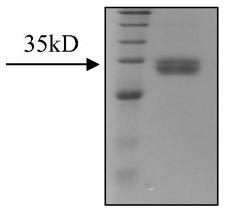Medical use and medicinal composition of VSIG3 small-molecule inhibitors
A technology of composition and inhibitor, applied in the field of medicine
- Summary
- Abstract
- Description
- Claims
- Application Information
AI Technical Summary
Problems solved by technology
Method used
Image
Examples
Embodiment 1
[0038] Expression and Preparation of Human VSIG3 Extracellular Protein
[0039] ExpiChO-STM Cells (Gibco, A29127), ExpiFecta mineTM ChO Transfection Kit (Gibco, A29129) were purchased from Thermofisher Scientific Company; human VSIG3-his plasmid was synthesized by Shanghai Jierui Biotechnology Co., Ltd.; sheep anti-VSIG3 antibody (AF4915) was purchased from American R&D Systems; sheep secondary antibody (CW0240S) was purchased from Kangwei Century Biotechnology Co., Ltd.; enhanced BCA protein concentration detection kit (P0009) was purchased from Beyond Biotechnology Co., Ltd.
[0040] 1. Recovery and culture of ExpiChO-STM cells
[0041] Take the frozen ExpiChO-STM cells out of liquid nitrogen, thaw them in a water bath at 38-39°C, and shake them constantly to make them melt quickly until only a small amount of ice cubes remain in the tube. Remove the cells from the water bath Take it out, spray it with 75% alcohol and open it in an ultra-clean bench, transfer the cell suspe...
Embodiment 2
[0076] Screening of Affinity Molecules of VSIG3 Protein by Competitive ELISA
[0077] Competitive ELISA method is used to screen the affinity molecules of VSIG3 protein, and the affinity of the screened object for VSIG3 protein can be characterized through simple co-incubation, washing and color development steps. Mainly rely on the reaction of horseradish peroxidase and TMB chromogenic solution to produce a color change for detection. During the experiment, the VSIG3 protein was coated on the microtiter plate by physical adsorption, and the non-specific binding sites that were not saturated by the protein at the bottom of the plate were removed after washing and blocking steps, and then the test object and VSIG3 specific antibody mixture were added. Finally, secondary antibody and TMB were added for color development, and the absorbance at 450 nm was detected. If the detection object does not bind to the VSIG3 protein, the detection antibody will completely react with VSIG3,...
Embodiment 3
[0108] Establishment of PBMC cell agonist model for identification of compound cell activity
[0109] CD3 antibody can bind to TCR on the surface of T cells to activate T cells, stimulate the proliferation of T cells and the secretion of interleukin 2. While the cells are activated, if there is an inhibitory signal produced by the VSIG3 protein in the system, the agonistic effect will be weakened. During the construction of the cell model, the agonist and VSIG3 protein were administered simultaneously, and the activation of T cells was judged by analyzing the secretion of cytokines in the cell supernatant.
[0110] 1. PBMC cell activation experiment
[0111] Day 1: Coating protein
[0112] The mixtures of CD-3 antibody and VSIG3 protein were respectively coated in 96-well plates. In the agonist group, CD-3 was diluted to 2.5 μg / mL with PBS, and in the inhibition group, the concentration of CD-3 antibody was kept constant, and different concentrations of VSIG3 protein were a...
PUM
 Login to View More
Login to View More Abstract
Description
Claims
Application Information
 Login to View More
Login to View More - R&D
- Intellectual Property
- Life Sciences
- Materials
- Tech Scout
- Unparalleled Data Quality
- Higher Quality Content
- 60% Fewer Hallucinations
Browse by: Latest US Patents, China's latest patents, Technical Efficacy Thesaurus, Application Domain, Technology Topic, Popular Technical Reports.
© 2025 PatSnap. All rights reserved.Legal|Privacy policy|Modern Slavery Act Transparency Statement|Sitemap|About US| Contact US: help@patsnap.com



